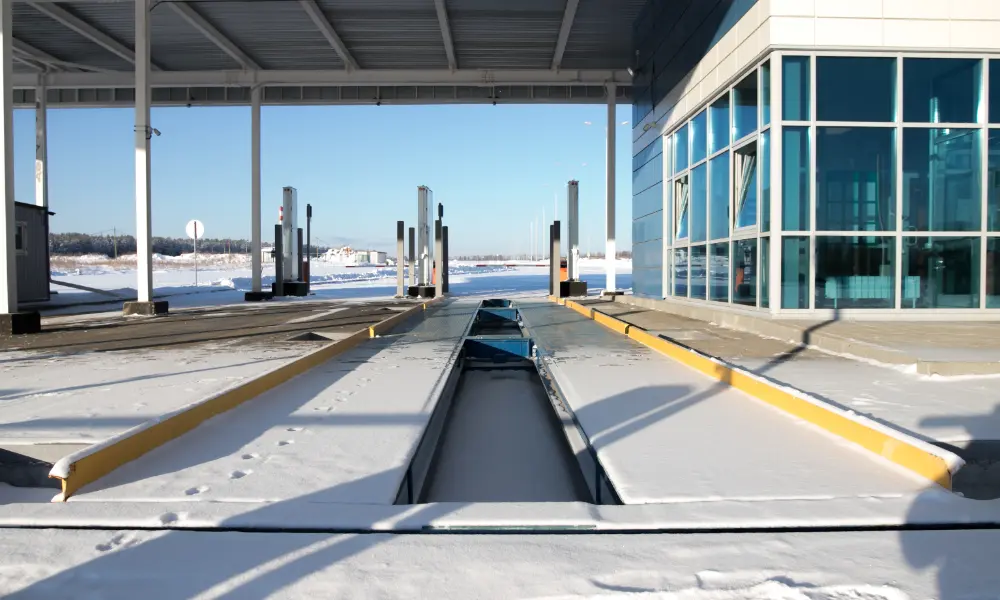Trucks play a vital role in transporting goods across the country, but navigating weigh stations can be confusing. If your truck weighs over 10,000 pounds, you’re typically required to stop at these checkpoints. This is important for ensuring road safety and preventing damage from overweight vehicles. Curious about the specifics or worried about potential fines? Stick around to learn exactly when and why you need to stop at weigh stations.
Trucks Required to Stop
Certain types of trucks must stop at weigh stations based on regulations, weight limits, and the type of cargo they carry. Here, you will find specific rules and requirements for these vehicles.
Commercial Trucks Regulations
Commercial trucks need to stop at weigh stations across many states. These trucks are monitored for compliance with state and federal regulations. For instance, in Texas, all commercial vehicles must stop when directed by signs or police officers.
States with mandatory stops for commercial trucks often include:
- California
- Texas
- Florida
These rules ensure that trucks operate safely and obey weight restrictions. Failure to stop can result in fines or other penalties. Remember, each state may have slightly different regulations, so always check local requirements before traveling.
Weight Limits and Measurements
Weigh stations use both static and dynamic weighing methods. In static weighing, the truck stops completely, and its weight is measured. Dynamic weighing happens as the truck moves over specialized scales.
Trucks with a gross vehicle weight (GVWR) exceeding certain thresholds must stop at weigh stations. For example, in Montana, trucks over 8,000 pounds must stop.
Key weight limits to remember:
- Trucks > 10,000 lbs in many states
- Trucks > 8,000 lbs in some states
- Trucks > 26,000 lbs in select states
Understanding these weight limits helps you prepare for mandatory stops and avoid unnecessary fines.
Specialty and Agricultural Vehicles
Specialty and agricultural vehicles often have specific rules. In South Dakota, agricultural vehicles and those over 8,000 lbs must stop at weigh stations.
Other examples include:
- RVs on the way to distributors or dealers – They often must stop, especially in states like Montana.
- Agricultural trucks – These trucks are monitored to ensure they are not overloaded when carrying products like grain or livestock.
Knowing whether your vehicle falls into one of these categories can save you time and trouble on the road. Always verify the regulations for the states you will be traveling through.
State-Specific Information
Different states in the U.S. have various rules for trucks stopping at weigh stations. The specific requirements can vary based on factors like gross vehicle weight (GVW) and the type of vehicle.
Variations in Weigh Station Rules
In California, any commercial vehicle with a GVW over 10,000 pounds must stop at weigh stations. This is also common in several other states including Alabama and Texas. On the other hand, Colorado has stricter rules requiring all vehicles over 26,000 pounds to stop and get clearance from state patrol or weigh stations.
Montana has a rule that requires trucks to stop if they are above a certain weight or if they are transporting certain goods. Remember, these thresholds and specific rules can differ widely from state to state, so it’s best to check the local regulations for any state you plan to drive through.
State Departments of Transportation
The Department of Transportation (DOT) in each state sets and enforces the regulations for weigh stations.
For example, the California DOT monitors weigh stations and ensures trucks comply with state laws regarding weight limits. Colorado’s regulations are enforced by the Colorado State Patrol, which works closely with the state DOT.
In Texas, the DOT collaborates with other agencies to conduct weight checks and enforce safety. Alabama’s DOT also plays a significant role in maintaining the safety and efficiency of the highways through weigh station checks.
Always refer to the respective state DOT’s guidelines to ensure compliance when planning your routes.
Compliance and Penalties
Truck drivers must follow strict weight regulations to avoid fines and penalties. It’s essential to know the rules and consequences to stay compliant.
Adhering to Weight Regulations
Compliance with weight limits is critical for safe and legal trucking. Trucks that weigh over 10,000 pounds typically need to stop at weigh stations, depending on the state. For example, in Georgia, agricultural vehicles, passenger or specialty vehicles, and commercial trucks exceeding 10,000 pounds must stop and weigh.
Weigh stations may use static or dynamic weighing methods. Static weighing involves stopping the truck, while dynamic weighing checks the weight while the truck is moving. Following these rules ensures that your vehicle is safe and within legal limits.
States also have specific entry points and roaming units to enforce weight compliance. Knowing the specific rules for each state you travel through can help you avoid unnecessary stops and fines.
Fines and Penalties for Non-Compliance
When you don’t comply with weight regulations, there are various penalties. If your truck exceeds weight limits, you may face fines or citations. For instance, in Colorado, vehicles over 26,000 pounds need clearance from a weigh station before use. Without this, your truck could be pulled over and fined.
Penalties can also include impoundment of the vehicle until the issue is resolved. Continuous non-compliance can result in higher fines, more frequent inspections, and potential loss of operating licenses. Some states have detailed procedures for what happens if you fail to stop at a weigh station.
Understanding and following these regulations can save you from costly fines and keep your operations running smoothly. It’s always better to stop, get weighed, and ensure you’re within the legal limits.
Safety and Inspection Procedures
Ensuring truck safety is vital for road security. Inspections at weigh stations focus on truck conditions to prevent accidents, especially for those carrying hazardous materials.
Routine Safety Checks
Routine safety checks at weigh stations involve inspecting various parts of the truck. Brakes and tires are critical components. Inspectors typically examine brake systems to ensure they function correctly. Worn or faulty brakes can lead to dangerous situations.
Tires are another focus. Inspectors check for proper inflation, tread depth, and signs of wear. Poor tire condition can cause blowouts, leading to accidents. Other areas that might be checked include lights, reflectors, and windshield wipers. These elements must work properly for safe driving, especially in poor weather.
Routine inspections sometimes involve a quick check of the truck’s load security. Ensuring that cargo is properly tied down prevents it from shifting and causing accidents.
Hazardous Materials Inspection
When carrying hazardous materials, inspections at weigh stations become even more critical. Inspectors check for proper labeling and documentation of these materials. This helps in identifying the substances and ensuring their safe handling.
Special attention is given to packaging and containment. Containers must be leak-proof and secure to prevent spills or leaks. Inspectors might also look at emergency response information. Trucks need to carry information about the hazardous materials they transport in case of an emergency.
Proper placarding on the outside of the truck is mandatory. These placards help first responders identify the materials and react appropriately in case of an accident. Ensuring these procedures are followed minimizes risks to the driver, other road users, and the environment.
Truck Driver Considerations
Truck drivers must meet several requirements to ensure they comply with regulations and schedule their routes effectively. It’s important to know what is expected of you and how to plan your journey to avoid delays.
Truck Driver Requirements
As a truck driver, you need to know the specific regulations governing weigh stations in each state. For example, in Colorado, drivers of vehicles over 26,000 lbs must get clearance from the Colorado State Patrol. In Connecticut, all commercial vehicles need to stop regardless of weight.
You also need a valid commercial driver’s license (CDL). Make sure your vehicle registration and inspection records are up to date. Some states like Texas require that all commercial vehicles follow signs or instructions from police officers to stop at weigh stations.
Impact on Scheduling and Route Planning
Weigh station stops can significantly impact your route planning and schedule. Knowing where weigh stations are located helps you plan your journey better.
Using tools like GPS and truck-specific route planning apps can help. States like South Dakota and Tennessee have various weigh stations, mainly along highways, where you need to prepare for potential delays.
Your route should account for the possibility of being required to stop at any point. This way, you avoid rushing and can maintain compliance without stress. Efficient planning helps you maintain a timely schedule while staying within legal weight limits and safety regulations.
Legal and Tax Implications
When driving a commercial vehicle, it’s important to understand the legal and tax responsibilities. Knowing about taxes and operating authority and the necessary permits and legal requirements is crucial.
Taxes and Operating Authority
Operating a commercial vehicle involves several taxes. You need to be aware of the International Fuel Tax Agreement (IFTA), which requires you to report fuel use in different jurisdictions. The Heavy Vehicle Use Tax (HVUT) is another major tax for vehicles over 55,000 pounds.
Failing to comply with these taxes can lead to heavy penalties. You also need to keep track of toll payments in various states. It’s essential to maintain accurate records for all these expenses to avoid any legal issues.
Having the right operating authority is also important. This refers to the permissions granted by the government to operate a commercial vehicle. Without this, you may face fines or have your vehicle impounded.
Permits and Legal Requirements
Operating a commercial vehicle across state lines requires various permits. For example, you may need a trip permit if your vehicle isn’t registered in that state. Overweight and over-dimensional permits are also necessary for larger loads.
You must also comply with weigh station regulations. Most states require trucks over 10,000 pounds to stop at weigh stations. Not stopping can result in fines or legal action.
Make sure your vehicle meets all safety standards and that your drivers have valid commercial driver’s licenses (CDLs). Staying compliant with these legal requirements ensures smooth operations and helps avoid costly legal issues.
Weigh Station Alternatives
There are alternatives to traditional weigh stations that can help meet legal requirements for truck weight limits. These include using portable and stationary scales, as well as planning your route to avoid weigh stations legally.
Stationary vs. Portable Scales
Stationary scales are permanent fixtures found at designated locations like truck stops. They provide a reliable way to check a truck’s weight without needing to visit a weigh station. These scales can handle heavy loads and are often calibrated for accuracy.
Portable scales, on the other hand, are mobile devices that can be used anywhere. They are smaller and can be carried in the truck, allowing you to weigh your vehicle at any convenient location. Portable scales are useful for quick checks but might not offer the same precision as their stationary counterparts.
Using either type of scale helps ensure you comply with weight regulations and avoid fines. This is especially useful if you frequently change your cargo.
Avoiding Weigh Stations Legally
Another way to manage weight checks is by legally bypassing weigh stations. Some states allow specific types of trucks to skip these stops, such as those carrying agricultural goods or personal possessions. Planning your route can help you avoid mandatory weigh stations.
Bypass systems can also be helpful. Services like Drivewyze enable trucks to bypass weigh stations based on weight compliance data. By subscribing to such services, you can save time and fuel.
Routes that avoid toll roads with weigh stations can also be beneficial. However, always ensure that these routes don’t have additional regulations or lower weight limits. This way, you meet requirements while keeping your operations efficient.





